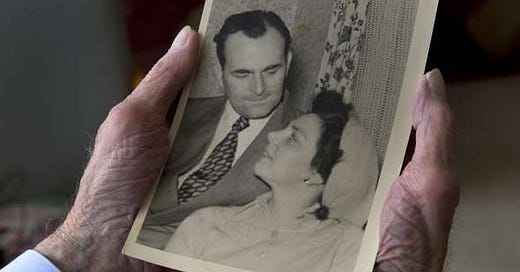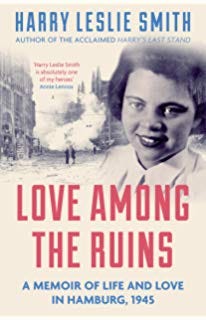Love Among The Ruins Valentine's Day 1945-1999
Without his beloved `Friede, Harry Leslie Smith would have lived a small and acrimonious life. She allowed him to leave behind the horrors of his youth and grow as a human being. As she confessed to me on her deathbed, “I am glad I could give the love your dad needed to survive.” It would take me many years and much investigation to finally understand that my mother, although in love with my father gave up much more to love him. After she died, I’d like to think I gave my dad a small portion of that love to survive. I wanted him to feel that the journey was worth it after all. It certainly gave him the time to make his Last Stand. Below is an essay of his about a chance encounter in the rubble of post war Germany that changed his life and hers.
Happy Valentine’s Day.
I have lived almost 100 years and I am approaching the long night of nonexistence, but I am not afraid because I have survived much turmoil: the Great Depression, the second world war, the cold war, the deaths of friends and also the hardest blows to my spirit, the passing of my beloved wife and middle son. But now, as time dwindles down like a clock with an ageing battery, my heart still beats strong, content and free of rancour because of one single event that changed my life and forged a thousand moments of joy for me.
It happened a long time ago, in the summer of 1945 when I was stationed in the city of Hamburg as part of the allied occupation force charged with enforcing the peace on a defeated German people.
Because of allied air raids against it during the war, the city was like Gomorrah the day after God’s wrath. It was an alien landscape, where city streets were dotted with scorched building facades cut up unevenly by the bombs and firestorms that had rained down upon its inhabitants for five long years. Even though it was now peace time, the city was feral with the dispossessed, the hungry, and the children orphaned by war and cruel circumstances.
The totality of Hamburg’s destruction was something I had never experienced in my 22 years of life, despite the misery I had endured in the slums of Barnsley and Bradford during my childhood. Only the brutality meted out to the innocent people of Belgium and Holland by the retreating Wehrmacht and SS divisions at the tail end of the war seemed comparable to what I saw in the first year of peace in Hamburg.
To survive emotionally during those nascent months of peace, I retreated into myself and hid in the words of poets and the sound of jazz music that I listened to on a radio. When off duty, I stumbled through the ruins, as lonely as Wordsworth’s cloud, overwhelmed by the hunger, the dirt, and the simple despair of ordinary folk that had lost everything in a war that was not of their making.
One day in August, I came upon a makeshift black market where German civilians bartered heirlooms for bread and meat and the chance to survive another day. In the throng, I noticed a woman who made my heart and head stumble in aroused confusion. Her stance, her look of defiance and grace made her appear to me like she was in Technicolor while everyone else around her was in sepia tone.
Rashly, I barged into that young woman’s life, and used what little German I knew to introduce myself to her. On a girlish whim because I seemed harmless, she graciously let me know her name. She was called Friede, and she allowed me to walk her to the apartment where she lived with her mother and an elderly couple who had been left homeless because of the war.
In any other time or circumstance we would not have been suited to each other or destined to become lovers. Friede was cosmopolitan and bohemian, whereas I was a young man who came from the wrong side of town lacking either education or a trade to earn my keep. But Friede had suffered during the war like I had suffered during the Great Depression, so we recognised in each other a fragility that needed both tenderness and protection from a harsh and unforgiving world.
In many ways we were old souls but we were also young, so Friede and I spent our free time together in reckless abandon exploring both the pleasures of the flesh and the wonders of the heart. It was remarkable to me that after months of courtship, Friede agreed to marry me and spend her life with me as a friend, lover and partner.
Fortunately, I knew even then that nothing in this life comes easy. The RAF, the British government and society were dead set against our nuptials. It took us two years to receive the necessary permission required to marry because Friede was considered a foreign national from a former enemy nation. However, both Friede and I persevered, and on 16 August 1948 we were wed by an RAF padre in Hamburg. That day we toasted our good fortune with champagne liberated from the officers’ mess.
Our love affair continued for more than 50 years and then on 2 July 1999 Friede kissed me one last time and then died from cancer. Not a minute goes by when I don’t feel blessed that I seized the day long ago in a Hamburg black market and turned one moment into a life time of discovery, love, friendship and kindness.
Thank you for reading my substack. Your support and subscriptions are more important for me now than ever because I am skating on the thinnest of ice. Your subscriptions help me maintain my dad Harry Leslie Smith’s legacy alive as well as keep me housed. On February 25, 2023 Harry Leslie Smith would have been a hundred. I think he would have been sickened that his warning to not make his past our future became true. Take care, John





